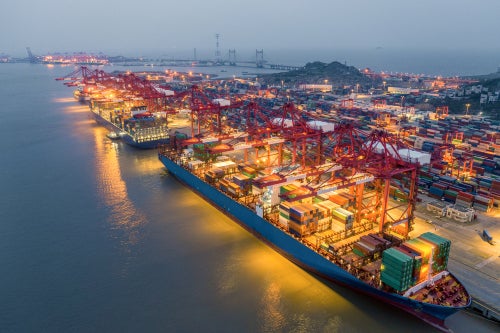
With the apparel industry heavily reliant on China and the Port of Shanghai said to be the busiest port in the world in terms of cargo tonnage, the UK Fashion and Textile Association (UKFT)’s CEO Adam Mansell says any shipping delays linked to a Covid lockdown will have a detrimental impact on the wider apparel industry.
The UKFT’s Mansell who promotes fashion and textile companies in the UK, highlights retailers have only just got back to operating on a normal level from the pandemic and lockdowns in that region of China will create more challenges.
While, the American Apparel & Footwear Association’s president and CEO Steve Lamar states China’s zero-Covid policy is outdated and needs to be reassessed in order to keep supply chains moving and the world’s economic recovery on-track.
He says: “The lockdowns in Shanghai are part of widespread supply chain disruption that continues to stymie our economic recovery. Our first goal is always to keep people healthy and limit the spread of Covid, which we now know how to do without severe closures. We’ve learned a lot about Covid and science has provided us with vaccines and new experience through which we can successfully keep people safe and our supply chains operational. It is time to revisit these outdated zero-Covid policies and replace them with current learnings so we can support both lives and livelihoods.”
Mansell explains it has been a full five years of unexpected difficulties for the UK’s apparel industry. He says: “It started with the disruptions caused by Brexit and these were followed by Covid.” He adds: “Today, we’re faced with the difficulties caused by the war in Ukraine and a number of retail outlets closing in Russia as a result, as well as rising levels of inflation. It’s a very difficult time for the industry as a whole.”
The National Retail Federation (NRF)’s vice president of supply chain and customs policy, Jon Gold, agrees with both Lamar and Mansell and points out this new lockdown adds further delays to an already congested supply chain at an important time for retailers – the post-Christmas period.
He says: “The ongoing uncertainty over Covid is hanging over the supply chain and a zero-Covid policy continues to impact the industry being able to move products from A to B.”
But Nils Haupt, head of corporate communications at Hapag-Lloyd AG, a German international shipping and container transportation company is keen to downplay the industry’s concern.
Speaking to Just Style he says: “Lockdowns like this one are normally very short and after one to two weeks the situation normally eases to minimise economic impact.”
The lockdown in Shanghai follows on from the lockdowns reported in Shenzhen earlier this month, which resulted in factories that were not involved with essential services being told to pause production due to China’s zero-Covid policy. However, last Friday (18 March), France24 reported that Shenzhen had partially eased lockdown measures, due to President Xi Jinping stressing the need to “minimise the impact” of the pandemic on the nation’s economy.
Harupt points out the lockdown in Shenzhen was far more severe than in Shanghai and notes: “For April we expect in both markets a complete relaxation of the situation.”



